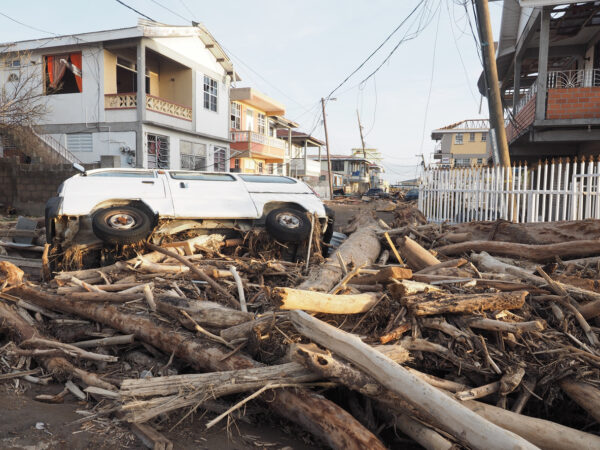Dr Carl-Friedrich Schleussner
Guest researcher
Climate Science and Impacts

Prof. Dr. Carl-Friedrich Schleussner is a guest researcher to Climate Analytics and Honorary Professor at Humboldt University Berlin. He previously led Climate Analytics' science team until 2024.
He has longstanding expertise in climate modelling and climate impact science, multi-year experience in providing scientific advice at the climate-policy interface including the UNFCCC process.
His publication record spans a wide range from climate extreme and climate impact projections to tipping elements and societal implications of climate change. He has published more than 80 peer reviewed publications, book chapters and reports and his work has been covered in major news outlets around the globe. In 2020 and 2021, he was elected as one of Germany’s "Top 40 under 40" by Capital-Magazine.
Carl is the consortium lead for the H2020 PROVIDE project.
Publications
- Climate overshoot implications for local adaptation planning
- Fair carbon removal obligations under climate response uncertainty
- Pfleiderer, Frölicher, Kropf, Lamboll, Lejeune, Capela Lourenço, Maussion, McCaughey, Quilcaille, Rogelj, Sanderson, Schuster, Sillmann, Smith, Theokritoff, Schleussner. Reversal of the impact chain for actionable climate information. Nature Geoscience. (2025) https://doi.org/10.1038/s41561-024-01597-w
- Schwaab, Hauser, Lamboll, Beusch, Gudmundsson, Quilcaille, Lejeune, Schöngart, Schleussner, Nath, Rogelj, Nicholls, Seneviratne. Spatially resolved emulated annual temperature projections for overshoot pathways. Scientific Data. 11 (2024) https://doi.org/10.1038/s41597-024-04122-1
- Overconfidence in climate overshoot
- Möller, Ernest Högner, Schleussner, Bien, Kitzmann, Lamboll, Regelj, Donges, Rockström, Wunderling. Achieving net zero greenhouse gas emissions critical to limit climate tipping risks. Nature Communications. 15 (2024) https://doi.org/10.1038/s41467-024-49863-0
- Ganti, Gasser, Bui, Geden, Lamb, Minx, Schleussner, Gidden. Evaluating the near and long-term role of carbon dioxide removal in meeting global climate objectives. Communications Earth & Environment volume. 5, 377 (2024) https://doi.org/10.1038/s43247-024-01527-z
- Esperon-Rodriguez, Gallagher, Souverijns, Lejeune, Schleussner, Tjoelker. Mapping the climate risk to urban forests at city scale. Landscape and Urban Planning. (2024) https://www.sciencedirect.com/science/article/pii/S0169204624000896
- Martyr, Saeed, Klönne, Nauels, Rosen, Schleussner. The 1.5°C limit and risks of overshoot. (2024)
- Martyr. Le seuil de +1,5°C et le risque de dépassement de ce seuil
- Nath, Hauser, Schumacher, Lejeune, Gudmundsson, Quilcaille, Candela, Saeed, Seneviratne, Schleussner. Representing natural climate variability in an event attribution context: Indo-Pakistani heatwave of 2022. Weather and Climate Extremes. (2024) https://www.sciencedirect.com/science/article/pii/S221209472400032X?via%3Dihub
- Effects of idealised land cover and land management changes on the atmospheric water cycle. Earth System Dynamics. 15, 2 (2024) https://esd.copernicus.org/articles/15/265/2024/
- Kornhuber, K., Klönne, U., Kellou, D., Schlessner, C.F. Kipppunkte und kaskadische Kippdynamiken im Klimasystem. (2024)
- Pfleiderer, P., Schleussner, C.F. Limited reversal of regional climate signals in overshoot scenarios. Environmental Research. (2024) https://iopscience.iop.org/article/10.1088/2752-5295/ad1c45
- Serdeczny, O., Andrijevic, M., Fyson, C., Lissner, T., Menke, I., Schleussner, C.F., Theokritoff, E., Thomas, A. Climatic risks to adaptive capacity. Mitigation and Adaptation Strategies for Global Change. 29 (2024)
- Aslanides, A., Ángel, A., Schleussner, C-F., Mendoza, C., Jones, D., Menke, I., Haynes, R. Advisory opinion on "Climate emergency and human rights"
- Grant, N., Fyson, C., Schleussner, C., Hare, B., Baxter, C.B. Unabated: the Carbon Capture and Storage 86 billion tonne carbon bomb aimed at derailing a fossil phase-out. (2023)
- Theokritoff, E., van Maanen, N., Andrijevic, A., Thomas, T., Lissner, L., Schleussner, C-F. Adaptation constraints in scenarios of socio-economic development. Scientific Reports. (2023) https://doi.org/10.1038/s41598-023-46931-1
- Fyson, C., Grant, N., Das, N., Maxwell, V., Reynolds, C., Rogelj, J., Schleußner, C.F., Waterton, O. When will global greenhouse gas emissions peak?. (2023)
- Schleussner, C-F., Andrijevic, M., Kikstra, J., Heede, R., Joeri Rogelj, J., Simpkin, H., Schmidt, S. Carbon majors’ trillion dollar damages. (2023)
- Martyr-Koller, R., Schleussner, C-F. Coastal loss and damage for small islands. Nature Sustainability. (2023) https://doi.org/10.1038/s41893-023-01244-z
- Andrijevic, M., Schleussner, C-F., Cuaresma, J.C., Lissner, T., Muttarak, R., Riahi, K., Theokritoff, E., Thomas, A., van Maanen, N., Byers, E. Towards scenario representation of adaptive capacity for global climate change assessments. Nature Climate Change. August 2023 (2023) https://doi.org/10.1038/s41558-023-01725-1
- Kornhuber, K., Lesk, C., Schleussner, C-F., Jägermeyr, J., Pfleiderer, P., Horton, R.M. Risks of synchronised low yields are underestimated in climate and crop model projections. Nature Communications. 14 (2023) https://doi.org/10.1038/s41467-023-38906-7
- De Hertog, S.J., Havermann, F., Vanderkelen, I., Guo, S., Luo, F., Manola, I., Coumou, D., Davin, E., Duveiller, G., Lejeune, Q., Pongratz, J., Schleussner, C-F., Seneviratne, S., Thiery, W. The biogeophysical effects of idealised land cover and land management changes in Earth system models. Earth System Dynamics. 14 (2023) https://doi.org/10.5194/esd-14-629-2023
- Baur, S., Nauels, A., Nicholls, Z., Sanderson, B.M., Schleussner, C-F. The deployment length of solar radiation modification: an interplay of mitigation, net-negative emissions and climate uncertainty. Earth System Dynamics. 14 https://doi.org/10.5194/esd-14-367-2023
- Kellou, D., Nauels, A., Klönne, U., Schleussner, C-F., Hare, B. Solar radiation modification: a dangerous distraction from required emissions reductions. (2023)
- Orlov, A., De Hertog, S., Havermann, F., Guo, S., Luo, F., Manola, I., Thiery, W., Lejeune, Q., Pongratz, J., Humpenöder, F., Windisch, M., Nath, S., Popp, A., Schleussner, C-F. Changes in land cover and management affect heat stress and labour capacity. Earth's Future. 11 https://doi.org/10.1029/2022EF002909
- Ganti, G., Gidden, M., Smith, C., Fyson, C., Nauels, A., Riahi, K., Schleussner, C-F. Uncompensated claims to fair emission space risk putting Paris Agreement goals out of reach. Environmental Research Letters. 18 (2023) https://doi.org/10.1088/1748-9326/acb502
- Theokritoff, Adelle Thomas, Tabea Lissner, Carl-Friedrich Schleussner, E., Thomas, A., Lissner, T., Schleussner, C-F. Interacting adaptation constraints in the Caribbean highlight the importance of sustained adaptation finance. Climate Risk Management. 39 (2023) https://doi.org/10.1016/j.crm.2023.100483
- Only halving emissions by 2030 can minimise risks of crossing cryosphere thresholds
- Overcoming global inequality is critical for land-based mitigation in line with the Paris Agreement
- 1.5°C is still in reach to reduce the worst climate risks – but only with immediate mitigation action and shifting finance
- Cumulative CO2 emissions in 1.5°C compatible pathways for Estonia
- ZERO IN on the critical decade
- Uncertainty in near-term temperature evolution must not obscure assessments of climate mitigation benefits
- Accounting for socioeconomic constraints in sustainable irrigation expansion assessments
- An emission pathway classification reflecting the Paris Agreement climate objectives
- No time for complacency: without closing the 2030 gap, net zero targets cannot prevent severe climate impacts
- MESMER-M: an Earth system model emulator for spatially resolved monthly temperature
- Extreme Atlantic hurricane seasons made twice as likely by ocean warming
- Accounting for local temperature effect substantially alters afforestation patterns
- An assessment of the adequacy of the mitigation measures and targets of the respondent states in Duarte Agostinho v Portugal and 32 other states
- Responsibility of major emitters for country-level warming and extreme hot years
- 1.5°C remains out of reach in the IEA's Announced Pledges Scenario
- ZERO IN on near-term warming and our changes of staying within 1.5°C
- The Global Methane Pledge and 1.5°C
- Methane reductions, ‘climate neutrality’, and choosing the adequate metric for emissions accounting under the Paris Agreement
- Climate cost modelling: analysis of damage and mitigation frameworks and guidance for political use
- The science of temperature overshoots: impacts, uncertainties and implications for near-term emissions reductions
- Machine-learning-based evidence and attribution mapping of 100,000 climate impact studies
- Intergenerational inequities in exposure to climate extremes
- The value of climate cooperation
- Fair distributions of carbon dioxide removal obligations and implications for effective national net-zero targets
- Global economic responses to heat stress impacts on worker productivity in crop production
- Effects of climate change on combined labour productivity and supply: an empirical, multi-model study
- Overview briefing on the IPCC Special Report on the Ocean and Cryosphere
- Overview briefing on the IPCC Special Report on Climate Change and Land
- 1.5°C to survive: evidence from the IPCC Special Reports
- Deadly Heat Stress to Become Commonplace Across South Asia Already at 1.5°C of Global Warming
- Pathways of climate resilience over the 21st century
- Loss and damage implications of sea-level rise on Small Island Developing States
- A fact check of the Climate Council of Australia’s report “Aim High Go Fast”
- From Paris To Makkah: Heat stress risks for Muslim pilgrims at 1.5°C and 2°C
- ZERO IN on a new generation of climate models, COVID-19 and the Paris Agreement
- Overcoming gender inequality for climate resilient development
- COVID-19 recovery funds dwarf clean energy investment needs
- Current and future global climate impacts resulting from COVID-19
- Incremental improvements of 2030 targets insufficient to achieve the Paris Agreement goals
- Two steps down the debt spiral: COVID-19 and tropical cyclones severely limit the fiscal space of many Small Island Developing States
- Fair-share carbon dioxide removal increases major emitter responsibility
- Multi-method evidence for when and how climate-related disasters contribute to armed conflict risk
- New models, old message: deep emission cuts in next decade are key
- Inconsistencies when applying novel metrics for emissions accounting to the Paris agreement
- Update: the dangers of blue carbon offsets: from hot air to hot water?
- A reminder for the 'Blue COP' - limiting warming to 1.5°C crucial for protecting oceans and ocean services
- Greenhouse gas accounting metrics under the Paris Agreement
- ZERO IN on the remaining carbon budget and decadal warming rates
- Recommended temperature metrics for carbon budget estimates, model evaluation and climate policy
- Towards a solid science base: loss and damage in the IPCC special reports
- Global climate change impacts on children
- Increasing risks of apple tree frost damage under climate change
- Unintentional unfairness when applying new greenhouse gas emissions metrics at country level
- A 1.5°C Compatible Carbon Budget for Queensland
- Attributing long-term sea-level rise to Paris Agreement emission pledges
- Governance in socioeconomic pathways and its role for future adaptive capacity
- Boreal summer weather becomes more persistent in a warmer world
- Water availability in Pakistan from Hindukush–Karakoram–Himalayan watersheds at 1.5°C and 2°C Paris Agreement targets
- Decarbonising South Asia and South East Asia
- Why geoengineering is not a solution to the climate problem
- Climate impacts at 1.5°C and 2°C – Results of the HAPPI DE Project Klimafolgen bei 1,5°C und 2°C
- How do we limit warming to 1.5°C: informing the Talanoa Dialogue question, “How do we get there?”
- 1.5°C Hotspots: Climate Hazards, Vulnerabilities, and Impacts
- Temperature-related mortality impacts under and beyond Paris Agreement climate change scenarios
- New Zealand’s Zero Carbon Bill – getting the Paris Agreement right
- Carbon budgets for the 1.5°C limit
- The many possible climates from the Paris Agreement’s aim of 1.5 °C warming
- Global mean temperature indicators linked to warming levels avoiding climate risks
- Freshwater stress on small island developing states: population projections and aridity changes at 1.5 and 2°C
- Crop productivity changes in 1.5° C and 2° C worlds under climate sensitivity uncertainty
- Risks for the global freshwater system at 1.5 °C and 2 °C global warming
- Coordinating AgMIP data and models across global and regional scales for 1.5°C and 2°C assessments
- Climate extremes, land–climate feedbacks and land-use forcing at 1.5°C
- Robust changes in tropical rainy season length at 1.5°C and 2°C
- Impacts of 1.5 versus 2°C on cereal yields in the West African Sudan Savanna
- Committed sea level rise under the Paris Agreement and the legacy of delayed mitigation action
- Climate impacts from a removal of anthropogenic aerosol emissions
- Why using 20-year Global Warming Potentials (GWPs) for emission targets are a very bad idea for climate policy
- “Because the ocean” – achieving the Paris Agreement 1.5°C temperature limit
- Tropical cyclones: impacts, the link to climate change and adaptation
- Linking sea level rise and socioeconomic indicators under the Shared Socioeconomic Pathways
- Getting it right matters – temperature goal interpretations in geoscience research
- In the observational record half a degree matters
- Half a degree additional warming, prognosis and projected impacts (HAPPI): background and experimental design
- Characterising half-a-degree difference: a review of methods for identifying regional climate responses to global warming targets
- Why negative CO2 emission technologies should not be classified as geoengineering
- The 1.5°C temperature limit in the Paris Agreement and 2016 temperature records
- Implications of the 1.5°C limit in the Paris Agreement for climate policy and decarbonisation
- Armed-conflict risks enhanced by climate-related disasters in ethnically fractionalised countries
- Science and policy characteristics of the Paris Agreement temperature goal
- Differential climate impacts for policy-relevant limits to global warming: the case of 1.5°C and 2°C
- Climate change impacts in Central Asia and their implications for development
- 10 key messages from the Structured Expert Dialogue
- Unacceptable risks posed by “climate neutrality” replacing “GHG emission reductions” in the Paris Agreement?
- Briefing note on the assessment “Differential climate impacts for policy-relevant limits to global warming: the case of 1.5°C and 2°C”
- 1.5°C risks and feasibility
- Five year commitments for the Paris Agreement: a fundamental issue for below 2°C and 1.5°C
- Briefing note on the report on the Structured Expert Dialogue on the 2013-2015 Review
- Climate change impacts in Latin America and the Caribbean and their implications for development
- Is it possible to return warming to below 1.5°C within this century?
- Turn down the heat: confronting the new climate normal?
- Rebuttal of “Ditch the 2°C warming goal!”
- Turn down the heat: climate extremes, regional impacts and the case for resilience
- Warning of climate science - again - written in Doha sand










